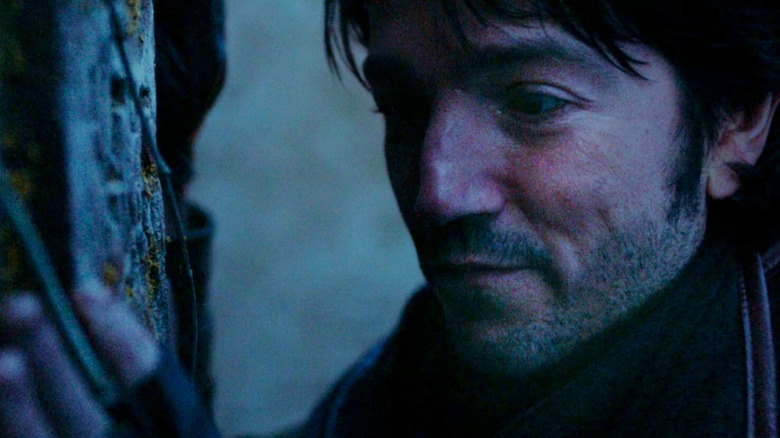
There will be spoilers for "Andor" Episode XII - "Rix Road"
"Andor" closes its first season strong with "Rix Road," the twelfth episode from Tony Gilroy and team, building on the framework of the funeral for Maarva (Fiona Shaw). Just about everyone heads to Ferrix, either returning or coming for the first time, to fulfill their own goals and ends. Dedra Meero (Denise Gough) heads to Ferrix to capture Cassian in a bid to learn the identity of Axis — the man in charge of the rebel activity she hopes to quash. Vel Sartha (Faye Marsay) and Luthen Rael (Stellan Skarsgård) join Sinta (Varada Sethu) on Ferrix so they can kill Cassian Andor to prevent the Empire from getting any more information about the nascent rebellion. Syril Karn (Kyle Soller) and Sergeant Mosk (Alex Ferns) head to the funeral in the hopes of bringing Cassian to Justice.
And, of course, Cassian Andor (Diego Luna) foolishly heads to Ferrix
On Coruscant, Mon Mothma (Genevieve O'Reilly) continues to struggle against her financial woes, going so far as to fake a fight with her husband, Perrin (Alastair Mackenzie). Naturally, this gets reported to Blevin (Ben Bailey Smith) and his return to the ISB as Partagaz (Anton Lesser) oversees the destruction of Anto Kreegyr and his ill-fated raid on Spellhaus. But none of that is as heartbreaking as the look on Mon Mothma's face when she offers her daughter up to betrothal to the son of a gangster.
On Rix Road, in fountain square, Maarva has plans for her funeral. And it looks like the rebellion gets a big start on the small, out-of-the-way planet called Ferrix.
Nemik's Manifesto
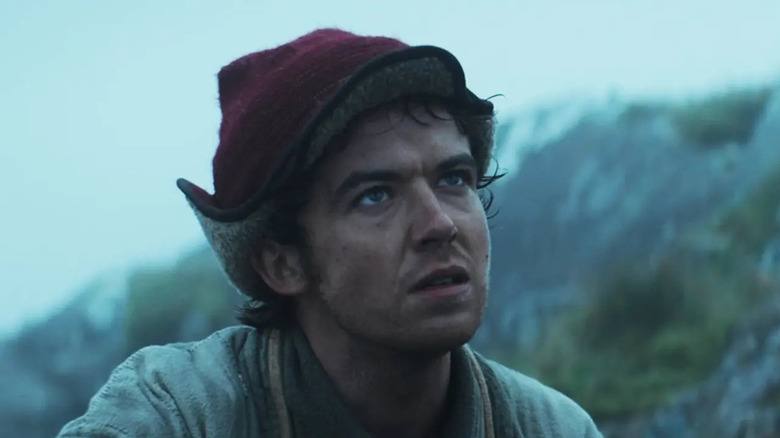
"Even the smallest act of insurrection pushes our lines forward," Nemik (Alex Lawther) says in his recorded manifesto. Nemik was in the Aldhani arc of "Andor," the young idealist and intellectual working on his manifesto and was so disheartened to learn Cassian was a mercenary. Before he died in the sixth episode of "Andor," he insisted that his manifesto be given to Cassian.
Whether it was some sort of revenge to cause guilt about his death, or whether it was some altruistic dream that Cassian would turn into a better person, we'll never know. But we see that it definitely has an affect on Cassian and is a key part of his journey. As Cassian listens from the relative, hidden safety of his family's old cruiser, it seems like Nemik practically narrates Cassian's future with "Rogue One: A Star Wars Story" and the entire story of the Rebellion.
"And know this," he says, "the day will come when all these skirmishes and battles and these moments of defiance will have flooded the banks of the Empire's authority and then there will be one too many. One single thing will break the siege." And it's easy to imagine that one single thing being the battle of Scarif, the first victory of the Rebellion, as related in the crawl of the very first "Star Wars" movie.
"Remember this," he tells Cassian, who practically paraphrases it later as they're advancing on the plans to the Death Star. "Try."
It's fascinating to think that this important bit of advice for these normal, everyday people. For a Jedi, it's very much, "Try not." It's become a too-often quoted bit of wisdom from "Star Wars" fans. But that's not what Yoda was saying, and it takes Nemik here to remind us that the first step to success is trying. And that's the first step Cassian needs to take to fight the Empire.
Maarva's Speech
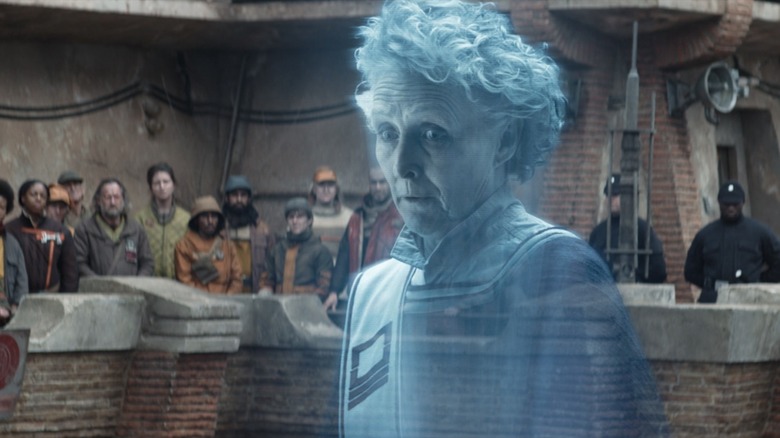
Maarva's funeral procession begins with the ring of the anvil over Rix Road. Like the stories and paintings of the American Revolution, the resistance is led by a drum and flutists playing a somber tune of independence. And when they reach the fountain square, B2-EMO projects a massive hologram recording of Maarva who offers a stirring speech about the need to wake up. It's a call to arms for the people of Ferrix. They have to wake up to the evil of the Empire. This is exactly the sort of thing Luthen has been hoping for, that the boot of the Empire will finally choke so hard that people will wake up and fight back.
The speech is shockingly stirring and brings to mind other great speeches like this that happen in the same era. It immediately brings to mind Ezra Bridger's speech on Lothal and Mon Mothma's speech across the galaxy, both appearing in "Star Wars Rebels". It rouses the soul and is so beautifully rendered that it makes one actually want to get up off the couch and fight some of the injustices that are going on in our world. Which is the point. Good art reflects the time and place that we're in, and there is injustice and tyranny all around us and those factions want to take more and more from us and put it in the hands of a privileged few.
For the people of Rix Road, the speech is a wake-up call. For some viewers, maybe it will be for them as well.
Classic Film
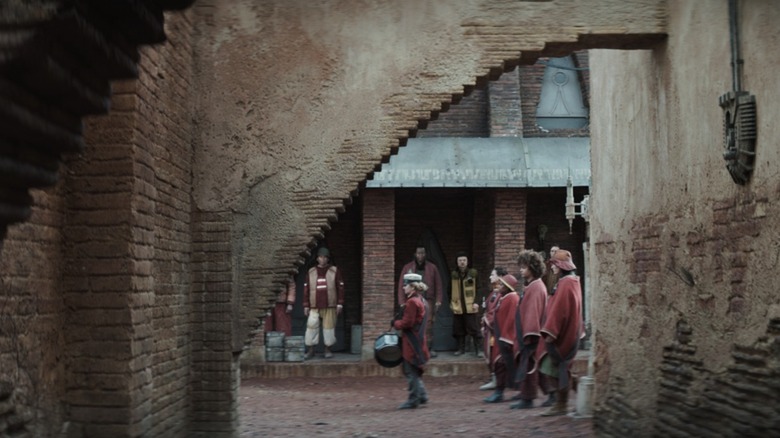
There were so many classic films that seemed to inspire this episode and I wanted to call three out specifically. The first is "The Godfather Part II." Throughout this episode, with the funeral in the foreground, Cassian Andor works behind the scenes to kill who he needs to kill and rescue Bix (Adria Arjona) from the clutches of her tormentors. It feels thematically and visually similar to Robert DeNiro's Vito Corleone murder of Don Fannuci during the procession on the streets in "The Godfather Part II". The musical even takes similar tones at times. In "Andor," though, the procession culminates in a violent clash that looks as though it could have been a protest against fascism on the evening news in contemporary society. The way it's photographed, too, with Cassian high up, looking down on the funeral, echoes DeNiro's run across the rooftops over the procession in the Best Picture Winner.
The second is Carol Reed's "The Third Man". Cassian feels very absent in the first bits of the episode. We don't know if he's made it to Ferrix, we have seen no part of his journey and have no idea if he even can make it. When we first see him, creeping through the town, it evokes the same thrill and feeling of Orson Welles's first appearance in "The Third Man." The heavy brick visuals of post-war Vienna look to be a black-and-white match for Ferrix and Cassian is very much at times that black market Harry Lime sort, but is learning, slowly to be more Holly Martins than Harry Lime. It's a clever bit of editing, too. Because the moment of Cassian's appearance works so well, the audience never asks, "How did he get there?" we just move on without them needing to spend real estate on the voyage because that's not relevant to the story.
The last one I want to call out is "Network." We all remember Howard Beale's infamous "I'm mad as hell" speech, but I think Maarva's funerary talk is the "Star Wars" equivalent of it and acted just as beautifully. They're both inciting of violence against the system and threaten to upend the status quo.
The Post-Credits Scene
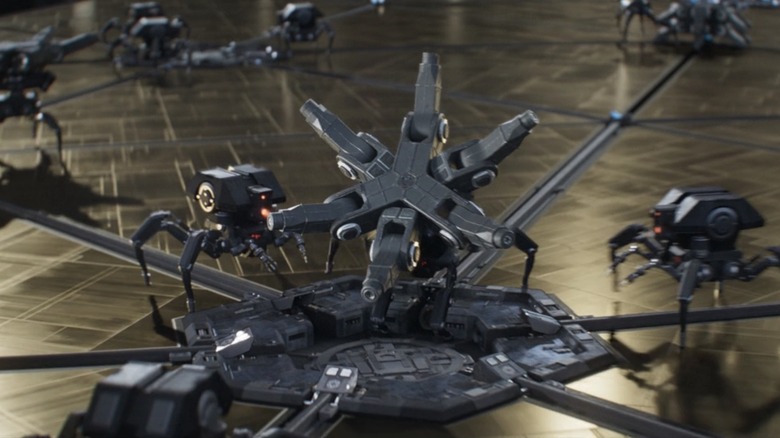
For those who stuck around for the post-credits scene, I'll be honest, I'm a little torn about this. "Star Wars" doesn't need to resort to post-credit scenes, and the moment we're given doesn't really fit in the narrative. None of the characters on the show know about the Death Star and this is a bit of meta-narrative to evoke emotion only in us. At the end of the day, it's a fun Easter egg to show us what exactly Cassian and his team in the prison on Narkina 5 were making. When does this take place? Is it real-time? Is it some time in the future? We don't know and, frankly, it doesn't matter.
All we need to know is that the Empire is using anything it can to build the Death Star — and that includes prison labor. They will stop at nothing to please their Emperor and do what they have to in order to stay alive and rule by fear. That's why they kill everyone in Anto Kreegyr's sortie. Partagaz even says it. They kill everyone and take no prisoners to "wipe the taste of Aldhani out of the Emperor's mouth."
Is that the mark of an intelligent government? Or people operating out of fear and controlling others by the same means?
The Verdict
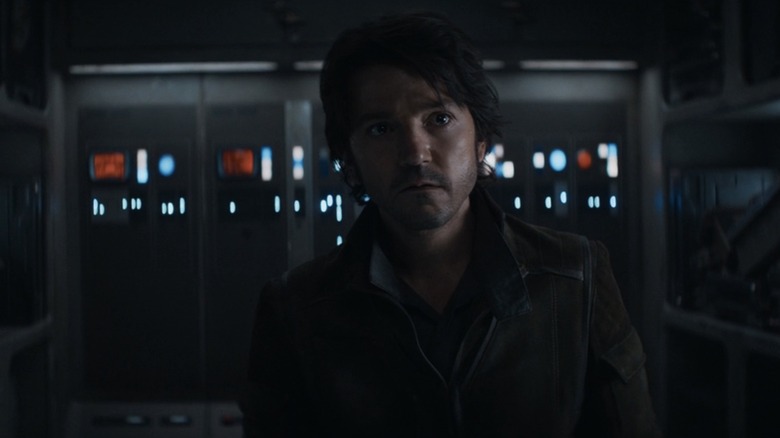
Tony Gilroy has hit a home run. I'm still dubious that the show, in its entirety, functions as great "Star Wars," but it's an incredibly well-written show and I'm glad we have it. This whole season has been poignant and thought-provoking and it's done what all great dramas do. It puts us in the shoes of people in impossible circumstances and shows us how they would react and gives us hope that we would react similarly or differently, as the case may be.
More than anything, this show feels like a manifesto against the Empire — against all evil Empires — written not by Nemik, but by Gilroy and his team. "Star Wars" has always been overtly political, but it's never felt this acute in such a stressful time in global politics, and I applaud Lucasfilm for bravely telling a story that aims to show the pressure people are under when they decide to dismantle the tools of their oppressors. There is a reckoning coming in the galaxy and it's instructive of the reckoning coming in our world.
It's such beautifully told storytelling and the writing is so crisp that it's hard to care about any faults one does find with the show. The dialogue drips with subtext and the world-building aids the thematic elements. It's just excellent drama, well-told. And the ending drops us right into an excellent trajectory for season 2.
Well done, Lucasfilm. Well done.
The entire first season of "Andor" is available now on Disney+.
Read this next: Star Wars Movie Villains Ranked Least To Most Powerful
The post Andor Episode 12 Gives Us An Explosive Season Finale That Offers a Glimpse of Rebellion appeared first on /Film.
0 Comments